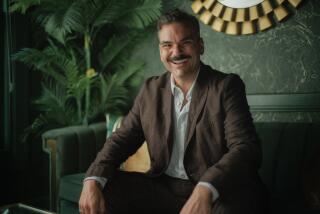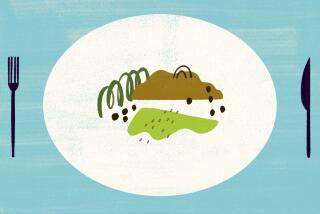Clarissa Dickson Wright dies at 66; costar of TV’s ‘Two Fat Ladies’
- Share via
When the offbeat BBC cooking show “Two Fat Ladies” was given a green light in 1996, costar Clarissa Dickson Wright did not have the highest hopes. “I found it very hard to believe,” she later wrote, “and thought perhaps it might be a cult series with a moderate but good audience. We had no idea.”
It quickly became an immense hit — on both sides of the Atlantic. In the U.S., where it made its debut in 1997, “Two Fat Ladies” helped grease Food Network’s ascent to a cable TV powerhouse, earning top prime-time ratings that made Dickson Wright and co-host Jennifer Paterson bona fide, if improbable, celebrities.
Both lard-loving English cooks of bounteous build with posh accents and salty tongues, they were filmed traveling the English countryside in a vintage motorcycle and sidecar to cook for priests, choirboys, farmhands, lacrosse players, even men who cleaned up after elephants. Fat in many glorious forms — butter, bacon, duck fat, cream — were essential ingredients for which the two women made no apologies.
Dickson Wright, the joyously impolitic and heftier of the two “Fat Ladies” who later riled audiences with her pro-hunting views, died March 15 in Edinburgh, Scotland, after a short illness, said her literary agents, Heather Holden-Brown and Elly James. She was 66.
Born to affluence in London on June 24, 1947, she was a rebel from an early age. She studied law and became a barrister to spite her abusive surgeon father, who wanted her to study medicine. She became an alcoholic after her Australian heiress mother died, was disbarred and squandered a multimillion-dollar inheritance with high living. “I was rich, good-looking and kept the pain at bay on a wave of champagne,” she wrote in her 2007 autobiography “Spilling the Beans.”
Finding herself broke and homeless, she became a cook in private clubs and homes, managing to pull off complicated dishes even though she was still regularly drinking herself into a stupor. In one of her first jobs she prepared a 10-course feast that included prawns in chaud froid and aspic, wild salmon with mousseline of trout, and hare with wild mushrooms flambeed in brandy. Afterward, she could not name a single dish, but years later she ran into one of the dinner guests who remembered every mouthful.
Her “mishmash of blackouts and unmanageability” lasted a decade, by the end of which she had ballooned to more than 200 pounds. She was 39 when she went into rehab and gave up her daily habit of two bottles of gin with several pints of tonic. She blamed her permanent bloat on damage to her adrenal gland from the quinine in the tonic water.
She was working in a cookbook shop in the mid-1990s when producer Patricia Llewellyn had the vision that changed Dickson Wright’s life. Llewellyn, who had once booked her on a show called “Eat Your Greens,” had a brainstorm after lunching with Paterson, a food writer and cook who nearly equaled Dickson Wright in heft. When Llewellyn saw Paterson roar off into London traffic on a motorbike, she thought: What if the two plus-sized cooks teamed up?
They had met only once before Llewellyn brought them together, but on the first day of taping, Dickson Wright later recalled, “it was as though we had cooked together all our lives.”
Paterson, who had raven hair, owlish black glasses and red lipstick, was fond of imitating flatulence in the kitchen. Dickson Wright, who had lank blond hair and a broad face untouched by makeup, was wry and tart. In the kitchen, they got along like two ripe peas in a twisted pod.
On a Christmas episode, for instance, Paterson swooned over a Christmas goose, praising its leftover “masses of fat you can treasure,” prompting Dickson Wright to add: “And even rub on your chest in case of emergency.” (Exactly what kind of emergency she left tantalizingly vague.)
The eccentric duo proved a sensation in the U.S. During an appearance on the home shopping network QVC to promote their first book, they sold 2,000 copies in 10 minutes. Aside from “a small nucleus of mutants in Los Angeles,” Dickson Wright said in a 1998 Washington Post interview, “I suspect most Americans actually do like cooking with butter and things like that.”
She wrote several books, including four best-selling “Two Fat Ladies” cookbooks with Paterson and the loftier “A History of English Food” (2011).
The show was said to have 70 million viewers around the world when Paterson died of lung cancer in 1999. The show was discontinued, but before long Dickson Wright had another series, “Clarissa and the Countryman,” which celebrated English rural life and ran until 2003.
She said that show was dropped because she had spoken too forthrightly in support of fox hunts and pheasant shoots at a time when animal rights activists in England were pushing a national ban on hunting. She admitted attending a hare-coursing event after the ban was enacted and further inflamed her detractors by praising the well-cooked badger, never minding that it was a protected species. Death threats poured in, but she remained unrepentant.
‘’When I was a teenager most of the pubs in the West Country had badger hams on the bar just like a jamon iberico. And it was delicious,” she said in the British newspaper the Telegraph in 2012. “It tasted like young wild boar.’’
A lover of men who never married, Dickson Wright is survived by two sisters.
Not long ago she described her ideal last meal, a lavish affair that would include such dishes as roast wing of beef, oyster beignets, shrimp from England’s Lancashire coast, and raspberries with heavy cream. “It is perhaps rather a rich meal,” she acknowledged. “But in the circumstances, I don’t think I will be too concerned.”
More to Read
Start your day right
Sign up for Essential California for the L.A. Times biggest news, features and recommendations in your inbox six days a week.
You may occasionally receive promotional content from the Los Angeles Times.







